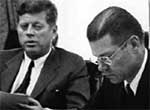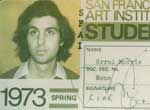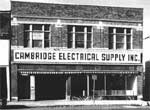 Former Bush voters advertise their disaffection.
Former Bush voters advertise their disaffection.by Philip Gourevitch
The New Yorker - August 23, 2004
Errol Morris, whose inventive and stylized documentaries include "The Thin Blue Line," "Mr. Death," and an Oscar-winning portrait of Robert McNamara, "The Fog of War," is also a prodigious director of TV commercials-the ultimate message movies. It's a lucrative sideline in which he takes considerable pleasure. He's made successful advertisements for such brands as Miller High Life, Adidas, and Volkswagen, although some of his favorite spots-one for Quaker Oats, for example, which shows an orangutan spooning porridge into his mouth, then setting aside the utensil and blissfully plunging his face into the breakfast bowl-have never been broadcast. A few years ago, Morris directed Apple's enormously popular "Switch" campaign, which consisted of vignettes about real people who had abandoned PCs for Macs. And, while he has never before been involved in electoral politics, this year Morris decided to make a series of documentary political ads featuring Republican switchers, people who voted for George W. Bush in 2000 and will vote for John Kerry this time around.
Morris, who lives in the echt-liberal enclave of Cambridge, Massachusetts, didn't actually know any such people, but, he told me, "the pollsters said they're out there-in America-and I'm really interested in what they have to say." After all, the outcome of the election is expected to hinge largely on swing voters, and, Morris said, "these ads are a way of talking to them. It isn't pollsters talking through actors. It isn't longtime Democrats talking to themselves. It isn't longtime Democrats hectoring Republicans. It's thoughtful Republicans-many of whom have decided to remain Republican-saying it's not us who are abandoning Bush; he's abandoned us, abandoned the Republican Party we've supported all these years. That is a very powerful message."
Morris knew exactly how he wanted the ads to look. He would shoot them on the Interrotron, a contraption of his invention, which uses two-way mirrors to project his face across the lens of the camera as he interviews people, so that his subjects address him eye to eye, and appear on film with maximal directness. There would be no props, no music, just the unscripted "eloquence of ordinary citizens" against a sheer and shadowless white backdrop: "Americans speaking to other Americans in their own words, expressing their beliefs and their hopes for the future," in an election "that will define how America is perceived around the world and, just as important, what America is for all of us." That was the pitch. Morris wanted to make the ads for the Kerry campaign, and he imagined interviewing the candidate on the Interrotron. "I thought that I could humanize him," he said. "To solve the problem of Bush being seen as a man of the people and Kerry as an aristocrat, I'd film Kerry exactly the way all the other people were filmed. I'd put him in the mix, and, by being one with all the rest, he would become a man of the people, speaking out with other Americans."
Ever since television advertising first figured in a Presidential election, in 1952, images of ordinary voters-frequently portrayed by actors-have been deployed to bolster politicians' cases in a variety of ways. In 1976, Gerald Ford attacked Jimmy Carter with a series of "person in the street" commercials, in which people from Georgia, shot in a cinema-verite style, explained that they'd like to vote for their governor, but Carter wasn't fit to be President. Other voters, from elsewhere in the country, spoke fondly of Ford, testifying to his appeal. Although Ford lost the election, the ads are credited with boosting his ratings in the final months of the race. Kathleen Hall Jamieson, the director of the Annenberg Public Policy Center at the University of Pennsylvania and the author of "Packaging the Presidency," counts the Ford ads as the most influential "real people" ads in a Presidential contest. But, Jamieson told me, the most arresting work in the genre was produced in 1964, when the Lyndon Johnson campaign ran an ad called "Confessions of a Republican."
"It was done with an actor, and it was scripted, but you were not supposed to know that," Jamieson said. "He was in a studio, he was sitting on a chair, and he was smoking-which, of course, he wouldn't be doing anymore-and he was talking about how he's been a Republican all his life. It's a stream-of-consciousness narrative, almost Joycean. He's a Republican, but the Republican candidate, Barry Goldwater, doesn't stand for what he supports, and he thinks about the Convention, and how the people at the Convention weren't people like him, and he worries about Goldwater's statements about tactical nuclear weapons and, you know, what kind of person would say that, what kind of person would he be as President." At one point in the ad, the man remarks about Goldwater, "I read now where he says, 'A craven fear of death is sweeping across America.' What is that supposed to mean? If that means people don't want to fight a nuclear war, he's right. I don't."
The ad went on for more than four minutes, an astonishing length to contemplate, now that the typical spot is thirty seconds. "Four minutes!" Jamieson said. "And it was riveting, very artfully done, a very effective ad." Johnson defeated Goldwater in a landslide. "This was a big part of the strategy," she explained. "To convince Republicans that Goldwater was not their kind of Republican and that they could vote for Johnson. The actor, in those four minutes, just walked you through the conversion process. You tapped into his state of mind." ("Confessions of a Republican" is among more than two hundred and fifty Presidential-campaign commercials that can be seen online at the American Museum of the Moving Image's remarkable exhibition "The Living Room Candidate.")
This year, the Kerry campaign has been appealing to centrist swing voters, much as Johnson did, with a moderate message of strength and optimism while depicting Bush as an extremist renegade, out of step with the mainstream conservatism of the Republican base. The ads that Morris proposed making for Kerry conformed to this approach, and the campaign expressed serious interest. But in a close race candidates tend to be especially cautious and conventional. "If you're doing an ad for Quaker Oats or Tylenol or whatever, there's a set of boundaries that you work within, but you're not really worried about offending anyone," Eric Korsh, one of Morris's producers, told me. "With political ads, as soon as you construct anything, it seems like everyone's first thought is Oh, my God, that's going to piss off x number of people. You get worried about what politicians worry about, which is inhibiting."
Kerry's most urgent advertising objective is to establish his Presidential credentials in a time of political anxiety and war, and he has run a predominantly positive, self-promoting television campaign, leaving the attack ads to independent political groups. These organizations are called 527s, after Section 527 of the Internal Revenue Code, which allows them to retain nonprofit status while running partisan ads, as long as they are not in any way coordinated with the parties or candidates they support. After months of fruitless discussions with the Kerry campaign about his ads, Morris concluded that the campaign's "maybe later" meant never, and he took the idea to Wes Boyd, the co-founder of the most successful and innovative of the 527s, MoveOn.
Advertising by independent activist groups has influenced elections in the past, most notably in 1988, when the right-wing National Security Political Action Committee produced the notorious Willie Horton ad, which helped the first President Bush destroy his opponent, Michael Dukakis. (A group called Swift Boat Veterans for Truth is now attempting to boost the younger Bush with an ad that seeks to discredit Kerry's combat service in Vietnam, and an outfit called People of Color United is running radio ads on black stations, denouncing Kerry as "rich, white, and wishy-washy.") But in the current election cycle Democrats have generally been the more aggressive exploiters of the 527 loophole, and also the leaders in harnessing the Internet as a political organizing, fund-raising, and mobilizing tool. MoveOn, which was started in 1998 by Boyd and his wife-former Silicon Valley entrepreneurs, who made their fortune with the Flying Toasters screen saver-has been uniquely successful in engaging its online constituency. Late last year, MoveOn sponsored an advertising competition, "Bush in Thirty Seconds," that drew thousands of entries. The winning spot, "Child's Play," which showed little kids toiling at menial jobs to pay off the Bush deficit, became famous when CBS refused to broadcast it during the Super Bowl.
MoveOn's participatory approach to politics makes for exceptionally speedy interaction between the organization and its activist base. Earlier this month, when Boyd wanted to establish a five-million-dollar program to organize volunteers to monitor the polls on Election Day in battleground states, he sent an e-mail to his list of two and a half million supporters, asking them to vote for the idea by pledging a million dollars. "Within twenty-four hours, $1.3 million came in," Boyd told me, and he said that this connection with the grass roots made him appreciate Morris's ad campaign. "For the longest time, we'd been looking for a way to do real-people ads, because we see ourselves as populists and as trying to amplify the voices of our members. I jumped on it immediately."
On July 1st, MoveOn sent out an e-mail and questionnaire seeking "authentic American voices committed to change" to take part in Morris's campaign. It didn't explicitly state that Morris was seeking Republican switchers, but the questionnaire was crafted to make converts from Bush to Kerry easily identifiable, and, of the twenty thousand responses MoveOn received, at least five hundred fit the criterion. Two weeks later, when shooting began, in a studio in the Boston suburb of Canton, that number had been winnowed to forty-one men and women from twenty-one states, who were brought before Morris and the Interrotron-ten a day-for interviews that lasted as long as an hour each.
During a break on the second day of filming, Morris stood with a paper cup of coffee in his hand, studying a board where still photographs of people he'd interviewed the day before were posted. He pointed to a woman named Kim Mecklenburg: "A financial adviser-she advises a lot of Republicans, and she said that she thought by doing this ad she might lose a sizable percentage of her clientele, and the moment that she had that thought she realized that she had to do it, because this is America and to think that way is absolutely out of the question in a democracy." He pointed to a man: "This guy made a hundred and eighty thousand dollars a year and now makes eight dollars an hour." There were two members of Diplomats and Military Commanders for Change. The first, William Harrop, a former Ambassador to Israel and Zaire, told Morris that he had spent his life trying to stay out of the news and avoid partisan politics, and that it was a measure of how profoundly he regretted his vote for Bush that he had set aside all his instincts and training to take part in a political ad. The second was George Moose, a former Assistant Secretary of State for African Affairs. "He was talking about the photographs from Abu Ghraib, and I asked him, 'What do those photographs say to you?' " Morris told me. "He said, 'They say to me that we're just like everybody else,' and there's a moment where you just see this sorrow in his face."
Morris was summoned back to the Interrotron. He pointed rapidly at more photographs, ticking off professions: "Ex-marine, fund manager, medical transcriptionist, a professor at a business school who teaches M.B.A.s and talked about how ashamed he is by what an M.B.A. has produced in the White House." Morris stood back from the portrait board. "My Mt. Rushmore," he said.
Rhonda Nix-thirty-six, blond, and trim-spends her working days stained with ink, rebuilding laser printers and toner cartridges, in Shreveport, Louisiana. Her husband's parents, retired public schoolteachers, own and run the business she works for, which is thriving (Halliburton is one of their biggest customers), and when her father-in-law learned that she was taking time off to fly to Boston to be in a political ad sponsored by MoveOn, he phoned her up and told her that he didn't want to have anything more to do with her.
"Tell me about that," Morris prompted.
"He has this attitude-he's a Southern man," Nix said, and explained, "Where I'm from, there's two things. You're Southern Baptist and you're a Republican. You're closed-minded." Her father-in-law's view is that we've got a Christian President from Texas and we've got to keep it that way, and although Nix said, "That's not good enough for me," she didn't blame him, exactly. Like everyone else she knew, she had been a "huge Bush supporter" in the 2000 election, and the next year, on September 11th, she had felt, she said, that "he's going to take care of us. . . . He's going to take care of America." But she also found herself wondering, Why do people hate us so much?
September 11th made Nix painfully aware of her ignorance of politics. "I didn't know anything about democracy," she said. "I don't even think I knew how to spell it." She decided it was "the patriotic thing to do" to get informed about America and the larger world, and, as the Administration's hunt for Osama bin Laden gave way to war in Iraq, Nix felt hoodwinked: "They used our fear from 9/11, and they shifted our direction to Saddam Hussein, to Iraq, when all the time it wasn't them." After that, she said, "I changed completely. I realized I was a Democrat."
Nix was born and raised "dirt poor"-without indoor plumbing-in Mississippi, and she dropped out of school in the ninth grade to help her mother support her younger brother and sister. At twenty, she had a son of her own, and she was soon raising him as a single mother. Now, she said, she had a good job, and a husband who believed in her (unlike his parents, he didn't care about politics), and they had found a house in a "higher class" suburban neighborhood, where her son could attend a good high school. Last year, Nix was delighted to receive a check in the mail for the Child Tax Credit. "It was a great help to me," she said. But recently she learned that she had been eligible for it only because she earned more than twenty-six thousand dollars a year. People who earned less, as she had when she was a single mother and needed the money more desperately, did not qualify for the credit, and it outraged her that a quarter of a million children of military servicemen and women are excluded from this government kickback for the same reason. "And these people are fighting for us!" Nix exclaimed. In a democracy, with so many more poor people than rich people, she said, "that doesn't make any sense to me."
In January, Nix planted a John Kerry sign in her yard, and in early July she found it pulled up and "stabbed to death" -torn and battered, with the words "Burn in Hell" scrawled on it. She put it back up. "It has to stay there," she said, and went on, "When my friends and family realized that my priorities, that my values were shifting in a whole new direction, I found myself arguing a lot with them, almost like I was trying to change what they believe in and trying to give them reasons. But then I realized I couldn't change them. I can only change myself." She was particularly distressed that her arguments with professed Bush supporters often ended when she asked if they were registered to vote and was told no. Nix considered such passivity to be unpatriotic.
Nix spoke for nearly an hour, time enough for a motivated, well-prompted person to tell you a great deal about herself and her concerns. It's tougher to express a world view in thirty seconds, which is how long Morris's ads are-and the last four seconds don't count, since the law requires that they be devoted to a placard and voice-over identifying the ad's sponsor. A week after Morris finished filming his interviews, I went to see him at his studio in Cambridge, and there, on the monitor, was Rhonda Nix in twenty-six seconds: "We've got to take care of this country. It upsets me that you can go and spend billions and billions of dollars trying to liberate other people, when there's so many people here-they don't need liberation, but they need health care, they need food on their table, they need education. It is time to invest in this country. That's what I want to hear about, that we're being taken care of-here, at home. I'm still a Baptist, but I'm no longer a Republican."
"See-part of what I like is that this is not traditional political advertising," Morris said. "They're not involved in making a hard sell. The people potentially are likable."
Another ad appeared on the monitor, showing a burly man with a warm, open face: Rick Dove, a retired Marine Corps colonel from North Carolina. "When am I going to hear my President say, 'I blew it, folks, the buck stops here, this is my mistake, and I'm going to learn from this and we're going to go on'? I've never heard it. It's not that I'm looking for an apology. I want an admission when things are wrong that I'm responsible for that. I've been registered as a Republican for a long, long time, and I cannot see four more years of that kind of leadership."
Morris's French bulldog, Jackpot, waddled into the editing room, and Morris got down on the floor to play with him. "The problem is that there are just too many of them," Morris said. But he wasn't complaining. He wanted to cut multiple ads from the best interviews and get them all on the air. He wanted to produce a simultaneous print-ad campaign-a medium that Kathleen Hall Jamieson credits MoveOn with "revivifying"-and he liked the idea of billboard ads as well. "They should just blanket areas with all of them," he said of his ads. "They shouldn't just run one per person-they should run multiples per person, so you get to know the person and it becomes fresh each time, not just seeing the same thing recycled again and again and again."
A woman was on the monitor now, Yvonne Wilder, a twenty-six-year-old business analyst from Cherry Hill, New Jersey: "If I had to do it again, I wouldn't have voted for Bush in 2000. We had a two-trillion-dollar surplus. Two trillion dollars is a lot of money. O.K.? And Bush, in three years he blew over seven trillion dollars. And, I would be fine if we actually would have something to show for that. We don't have, you know, universal health care, we've cut benefits for veterans, No Child Left Behind is a joke-we can't afford another four years of George Bush. It would just be disastrous."
In another ad, a woman in a red flannel shirt, Deborah Wood, of Wimberley, Texas, said, "Let's get religion involved in all this. When you have Osama bin Laden waging a religious jihad-a war against America for religion-and then you have George Bush saying that God is on our side, it's like a huge pissing contest. Who's going to blink first? We're going to have a huge holocaust war if we don't get George Bush out of there." Morris chuckled. "I don't think you can run that one," he said as another cut from Wood's testimony came on the screen. This time, she said, "I don't like to be lied to. I can handle the truth. Where are these mobile labs? Where's the W.M.D.s? Where's the smallpox? If I were a mother of one of those people that were killed-the soldiers that were killed over there-I'd want to know. My kid has died because of you, my kid is dead in the ground because of you. I feel very betrayed. I feel like this whole country is betrayed."
Morris was sitting in a chair again. " 'Betrayal' is a very strong word. Since olden times, betrayal has always had a certain cachet." He sounded pleased.
"I think the biggest thing and most important part of this work is the breaking down of stereotypes," MoveOn's Wes Boyd told me. "The way that political consultants and therefore leaders look at the electorate is sophomoric-they classify people into these groups, and then they think that what they have to do is slice and dice and then communicate to each of the individual groups. It's essentially a process of pandering, and that's not what America should be about." Instead of treating voters as demographic phenomena to be manipulated and patronized, Boyd said, "this kind of ad campaign brings out how impressive the American people are, and how much we should be listening to them, and how much the stereotypes that are projected onto us all the time are bullshit." He saw Morris's ads as "asking people to lay down their partisanship for a second to think about what they really care about."
Last week, MoveOn posted seventeen of the ads on its Web site and gave viewers two days to vote for their favorites. A hundred thousand people responded. The first-place ad showed Lee Buttrill, an ex-marine who fought in Iraq. It will be aired during the Republican Convention. Ads featuring Rick Dove and Kim Mecklenburg placed second and third, and Boyd expects to start testing them and others in various markets in the coming weeks. In the hours after the winners were announced, MoveOn collected donations for running them at a clip of a hundred thousand dollars an hour. If MoveOn's polling finds the ads to be effective, Boyd will spend millions on them in the fall. "The truth is we don't know if this will work, or how it works," he said. But he thought the political climate was auspicious. "People are pissed, they want change, and they're very motivated."
Boyd's assessment is echoed by Tony Fabrizio, of the Republican polling firm Fabrizio, McLaughlin & Associates, who issued a gloomy memorandum last month on Bush's prospects among swing voters. "Our analysis of 'undecided' voters in our most recent Battleground State Survey reveals that they are currently poised to break away from President Bush and to John Kerry based on the following findings," he wrote. "They are more than twice as likely to see things headed down the wrong track as compared to voters overall. They give President Bush a net negative image rating. They give President Bush a net negative job-approval rating. A solid majority sees the country as being worse off than they were four years ago. They are significantly more pessimistic about the current state of the nation's economy. They are significantly more pessimistic about their own current financial condition. They are twice as likely to see the number of jobs in their area as decreasing instead of increasing. They are significantly more likely to favor the federal government doing more as opposed to doing less. They are more likely to be pro-choice on the issue of abortion. They are more likely to have seen or heard advertising critical of President Bush than of John Kerry in the past year. John Kerry holds a slight net positive image rating." In conclusion, Fabrizio wrote, "Clearly if these undecided voters were leaning any harder against the door of the Kerry camp, they would crash right through it . . . which would hand Kerry a lion's share of these states."
Virtually all the indicators that Fabrizio catalogued tipped further in Kerry's favor after the Democratic Convention in Boston. Kerry has responded by making more frequent campaign stops in territory that earlier this year was considered to be unshakably Republican, placing Bush on the defensive. Indeed, the Bush campaign's advertising strategy has shifted dramatically, from an overwhelming focus on anti-Kerry attacks to glowingly positive spots reminiscent of Reagan's "Morning in America" commercials-an effort to shore up Bush's base among precisely the same voters that Morris's ads address most directly.
"We're not making any claims about how many might switch," Morris's producer Eric Korsh told me. "We're just saying, Here are some stories of people who have. We hope there are some people who think just like that, and that one of the spots will speak to them." If Michael Moore's anti-Bush "Fahrenheit 9/11" is generally seen as "preaching to the choir," Korsh said, "Errol would like these spots to be a significant part of a change." Morris was more cautious. "How can people like us possibly know how people in swing states will view this material?" he said. Anything was possible. "But these lives, these voices-I really like them. It almost makes you want to be a Republican."







